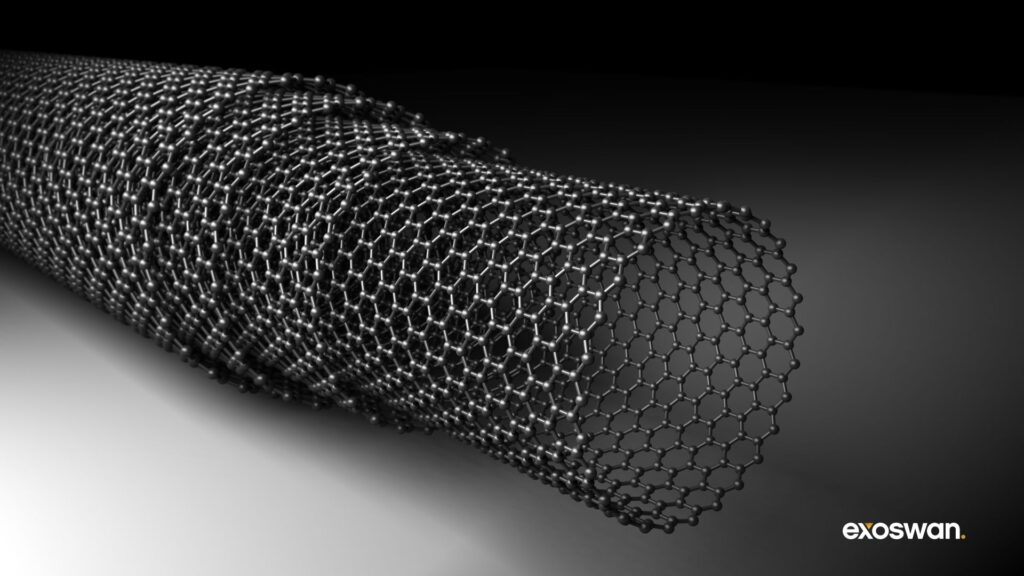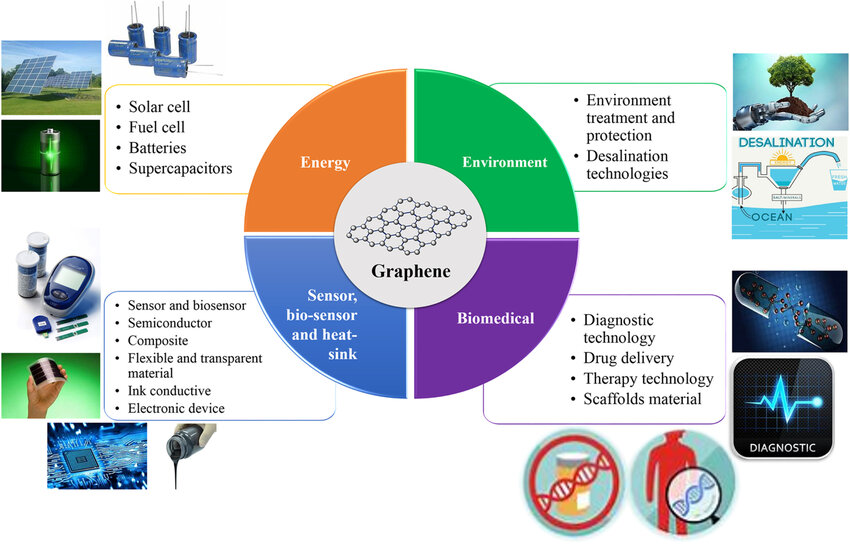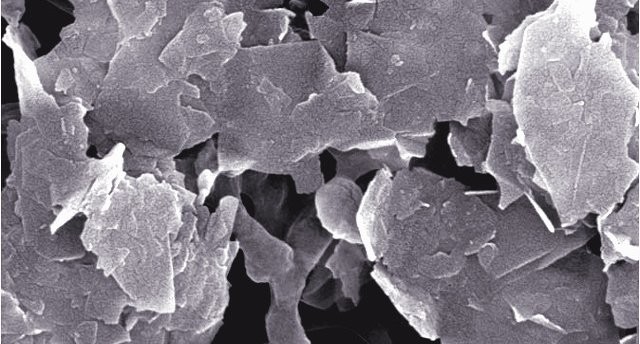Once hailed as a “wonder material” that would replace silicon and steel, graphene spent two decades accumulating Nobel Prizes and billion-dollar government initiatives—alongside commercial failures. The collapse of publicly traded companies like Versarien and Applied Graphene Materials marks the sector’s brutal but necessary consolidation. The hype cycle has cleared. What emerges is a cleaner, more legible investment landscape.
The thesis we’re tracking centers on graphene’s emergence as a high-performance additive—used in small quantities to unlock new performance tiers in specific industrial verticals. This role leverages graphene’s unmatched properties (200x stronger than steel, better electrical conductivity than copper, 2600 m²/g surface area) without requiring the wholesale retooling of global manufacturing.

Four commercial pillars define the investable terrain:
- Energy storage leads as the primary volume driver. Graphene enhances lithium-ion batteries and supercapacitors with faster charging, higher energy density, and extended lifespan. The graphene battery market—valued at $244 million in 2025—is projected to hit $2.1 billion by 2033 at 31% CAGR, pulled by electrification across EVs, grid storage, and consumer electronics.
- Composites and coatings represent the industrial-grade, bulk-additive play. Graphene composites allow aerospace and automotive to enjoy 20-30% weight reductions while gaining thermal management and corrosion resistance. The thesis here hinges on manufacturing simplification: a single graphene-enhanced part replaces complex assemblies of metal, heaters, and chemical coatings.
- Electronics and sensors occupy the high-purity, high-margin segment. Graphene’s optical transparency and flexibility position it as the replacement for brittle Indium Tin Oxide in flexible displays and wearables. More significantly, its atomic thinness enables a new class of ultra-sensitive biomedical sensors moving from lab to commercial prototype.
- Filtration through graphene oxide membranes addresses complex challenges in water desalination and industrial pollutant removal, offering energy-efficient solutions where legacy technologies falter.
Graphene’s timeline parallels carbon fiber’s trajectory. Invented in the 1950s, carbon fiber required 30-40 years to reach widespread industrial adoption. Graphene, isolated in 2004, is tracking the same arc. Its current era marks the transition from research-dominated to industrial-commercial phase.
Why now? Three barriers historically blocked adoption: cost, consistency, and integration. Industrial-grade graphene nanoplatelets now trade at $50-75 per kilogram, approaching cost-parity with traditional additives like carbon black. Quality standards from ISO and The Graphene Council are establishing trust in a market once plagued by “fake” graphene. Integration challenges have spawned an entire midstream sector offering pre-dispersed masterbatches that drop directly into existing manufacturing lines.
The opportunity concentrates in companies with defensible IP, scalable production processes, and industrial partners actively integrating graphene into product lines. This watchlist maps that territory.

Upstream Graphene Producers
Upstream graphene stocks control production at scale, manufacturing graphene nanoplatelets for industrial applications. Their thesis hinges on cost and consistency—driving prices toward parity with traditional additives while maintaining quality standards. Success depends on production capacity, vertical integration into customer-ready formats, and securing anchor partnerships that provide volume visibility.
NanoXplore Inc. (TSX: GRA, OTCQX: NNXPF)
NanoXplore operates with arguably the most de-risked business model in the sector. The company runs one of the world’s largest graphene nanoplatelet production facilities at 4,000 metric tons per year, but its thesis hinges on vertical integration, not volume. Rather than selling raw powder, NanoXplore manufactures graphene-enhanced masterbatches and finished composite products that customers drop directly into existing manufacturing lines. This solves the dispersion barrier that has killed adoption for competitors.
The commercial anchor: Martinrea International, a major Tier 1 automotive supplier, sits as a strategic shareholder. This relationship provides a captive, high-volume customer base and graduates NanoXplore from a speculative materials play into an automotive lightweighting solutions provider. The company is executing a CAPEX build-out through 2026 for its GrapheneBlack sheet molding compound plant, targeting the structural parts market. This positions NanoXplore at the intersection of two industrial mandates: lightweighting and electrification.
First Graphene Ltd. (ASX: FGR, OTCQB: FGPHF)
First Graphene’s moat is regulatory, not technical. The company operates a 100-tonne-per-annum facility producing PureGRAPH-branded nanoplatelets, targeting high-volume industrial applications in concrete, elastomers, and composites. What separates First Graphene from the failed players is its regulatory approval to sell industrial quantities in both Australia and Europe—the only producer globally with this dual clearance.
In a market historically plagued by low-quality material and trust erosion, regulatory validation functions as a commercial asset. The company is in early commercialization, securing volume agreements with Breedon Group (the UK’s largest cement producer) for 40-60 tonnes of graphene-enhanced cement and shipping industrial-scale graphene-enhanced thermoplastic polyurethane for work-boot soles. First Graphene’s thesis concentrates on being the trusted, verified supplier as the industrial additive market scales.
Black Swan Graphene (TSXV: SWAN, OTCQX: BSWGF)
Black Swan executes a capital-light scaling strategy, targeting 140-150 tonnes per year by end-2025. The company supplies graphene-enhanced masterbatches to polymer and concrete partners, but owns minimal production infrastructure. Instead, it operates through strategic partnerships: Thomas Swan & Co. handles production and distribution, while Nouveau Monde Graphite provides graphite feedstock.
This structure allows faster scaling with lower capital requirements, but introduces co-dependency risk. Black Swan’s thesis is operational flexibility—the ability to scale production partnerships faster than competitors building proprietary facilities. The trade-off: execution depends on partner performance and relationship stability. This is the emerging producer play for investors willing to accept partnership risk in exchange for faster market penetration.
HydroGraph Clean Power (CSE: HG, OTCQB: HGRAF)
HydroGraph represents a pure technology differentiation bet. The company’s entire thesis rests on its patented “explosion synthesis” production process, which uses detonation to create what it calls “Fractal Graphene” at 99.8% purity. Rather than a volume play, it’s a premium product strategy targeting high-performance applications in energy storage, sensors, and composites where batch consistency and purity command price premiums.
The company has secured “Verified Graphene Producer” certification from The Graphene Council, establishing third-party validation in a market skeptical of purity claims. HydroGraph’s success depends on proving that its reactive, high-purity material delivers measurable performance advantages that justify premium pricing over bulk graphene nanoplatelets. This is an early-stage technology play targeting proprietary process superiority in specialty applications.

Midstream Graphene Integrators
Midstream graphene stocks capture value at the integration chokepoint, solving the dispersion and agglomeration problems that block industrial adoption. Through functionalization and proprietary processing, they make graphene usable for end manufacturers. The business model is high-margin IP and technical services rather than commodity material sales.
Haydale Graphene Industries (AIM: HAYD, OTCPK: HDGHF)
Haydale occupies the integration layer through its patented HDPlas plasma functionalization process. The company doesn’t produce graphene, but it makes graphene usable. The process grafts specific chemical groups onto graphene surfaces, enabling perfect dispersion in resins, inks, and polymers. This solves the agglomeration problem that has blocked industrial adoption.
Haydale operates as a service and IP company. Customers present integration challenges, and Haydale develops bespoke functionalized solutions. Current commercial traction sits in conductive inks for biomedical sensors (including microRNA detection for kidney patients) and graphene-enhanced tooling for carbon fiber manufacturing, where trials with Prodrive doubled tool lifespan. This is a high-margin, capital-light model selling technical solutions rather than commodity materials.
Directa Plus (AIM: DCTA, OTCPK: DTPKF)
Directa Plus produces pristine, chemical-free G+ nanoplatelets through a proprietary plasma super-expansion process, then integrates these materials into end-products focused on textiles and environmental remediation. The company is executing a turnaround, showing 15% revenue growth in H1 2025 with 38% EBITDA improvement while upgrading production for triple capacity and lower costs.
The de-risking element: a majority-owned Environmental Remediation division (Setcar) that generated 79% of 2024 revenue. This division uses Grafysorber products for industrial cleanup, serving major clients including OMV Petrom and Ford. This commercial engine provides stable cash flow funding more speculative textile and battery compound R&D. Directa Plus is a turnaround story with revenue-generating operations in environmental services backstopping development-stage applications.
Downstream Graphene Applications
Downstream graphene stocks use the material as a critical component in specific end-products. An investment here is a bet on the product’s commercial success, not the graphene material itself. Their thesis hinges proprietary technology, IP strength, and partnership pathways to market. These carry the highest risk and potential reward.
Graphene Manufacturing Group (TSXV: GMG, OTCQX: GMGMF)
Graphene Manufacturing Group is a binary bet structure. Near-term revenue comes from THERMAL-XR, a graphene-enhanced HVAC coating that improves heat transfer and energy efficiency, now distributed through major networks. This provides early-stage cash flow, but represents the supporting act.
The primary thesis: a proprietary Graphene Aluminum-Ion battery developed with the University of Queensland. The company claims this lithium-free, rare-earth-free chemistry can charge up to 70x faster than lithium-ion with triple the cycle life. An Australian patent has been granted. This sits at Battery Technology Readiness Level 4—lab validated, not production-ready.
This is a moonshot play structured like a venture capital investment. THERMAL-XR revenue funds battery R&D. If the G+AI battery scales to commercial production, this becomes a revolutionary, sector-defining technology. If scaling fails, equity value collapses to the HVAC coating business, which doesn’t support current market positioning. GMG requires venture risk tolerance and a long time horizon.
Zentek Ltd. (NASDAQ: ZTEK, TSXV: ZEN)
Zentek is an IP development and commercialization company built around ZenGUARD, a patented graphene-oxide coating with 99% antimicrobial properties and enhanced viral filtration. The company is executing a strategic pivot after its initial COVID-19 surgical mask market faded. The new thesis centers on transferring ZenGUARD IP to the larger, more durable HVAC and indoor air quality market.
The company is pre-revenue and developing additional IP including ZenARMOR corrosion coatings and a graphite-based fire retardant. This is a patent portfolio play dependent on securing a major licensing or commercial partner for HVAC applications. Zentek represents execution risk in its purest form—the bet is on management’s ability to commercialize IP across multiple applications after its initial market target evaporated.
Archer Materials Ltd. (ASX: AXE, OTCPK: ARRXF)
Archer operates as a pure fabless R&D developer, inventing and patenting semiconductor devices without manufacturing capability. The company focuses on two projects: the 12CQ carbon-based qubit processor for quantum computing and a graphene biochip for at-home medical diagnostics that can monitor biomarkers like potassium levels from a single blood drop.
This is the earliest-stage company on the watchlist, with lab demonstrations expected end-2025. The strategic pragmatism: Archer is pursuing a dual-technology approach on its biochip, developing both a silicon version (offering faster commercialization through existing manufacturing via partnership with IMEC, a world-leading foundry) and a graphene version as next-generation, high-performance hardware.
This hedge demonstrates management focused on realistic revenue paths rather than pure science. Archer is a long-duration, high-risk venture bet on fabless IP value and partnership model execution. The thesis requires belief that the company can navigate the valley of death between lab demonstration and commercial partnership without burning through capital reserves.
Onshoring & Equipment Proxies
These graphene stocks offer exposure through non-traditional structures: vertical supply chain integration, equipment manufacturing, or business model transitions. They provide sector access with risk profiles distinct from pure-play producers or application developers. This segment includes both the most conservative and most speculative positions on the watchlist.
Talga Group (ASX: TLG, OTCQX: TLGRF)
Talga is a geopolitical supply chain play masquerading as a materials company. The company operates a vertically integrated “mine-to-anode” model, starting with a wholly-owned high-grade graphite mine in Sweden, processing that graphite, and creating Talnode-C anode material for lithium-ion batteries.
The thesis is onshoring, rather than graphene innovation. European EV Gigafactories are approximately 99% dependent on Chinese-supplied anodes. Talga positions as the only large-scale, secure, sustainable (using clean Swedish hydropower), European-sourced anode supplier. The company is also developing recycled anode materials (Talnode-R), strengthening its circular economy and ESG credentials.
This is less about material performance and more about strategic supply chain positioning as Europe builds battery manufacturing sovereignty. Talga benefits from the intersection of industrial policy, geopolitical decoupling, and ESG mandates.
CVD Equipment Corp. (NASDAQ: CVV)
CVD Equipment is the classic picks-and-shovels play. The company manufactures Chemical Vapor Deposition systems required to produce high-purity, monolayer graphene films for electronics applications. CVD Equipment sells no graphene; it sells the machinery that produces it.
This is a revenue-generating, profitable business. Q3 2025 showed $7.4 million in revenue with $384,000 net income. CVD serves as a proxy for R&D spending in graphene electronics, sensors, and other advanced materials like Silicon Carbide for EVs (another core CVD Equipment market). As commercialization in these sectors accelerates, demand for equipment grows.
This represents the most defensive graphene exposure. CVD Equipment is non-correlated to the bulk composites market and depends on the growth of the entire R&D ecosystem rather than any single company’s IP success. The trade-off: a smaller addressable market than the application pure-plays.
The End of the Graphene Winter?
Today’s cleaner investment landscape for graphene comes on the heels of a brutal but necessary culling. Applied Graphene Materials sold all operating subsidiaries, technology, and IP for $1.3 million after failing to raise continuation capital—total shareholder wipeout. Versarien placed core graphene subsidiaries into administration and is selling its remaining assets.
These failures share common characteristics: unfocused business models, high cash burn rates without clear paths to revenue, and fatal dependency on external financing in a post-hype market. The lesson is operational discipline. In speculative advanced materials, capital is no longer available for companies without scalable, near-term revenue visibility.
The surviving companies on this watchlist are distinguished by either existing revenue (CVD Equipment, Directa Plus, NanoXplore), strategic anchor customers (NanoXplore, First Graphene), or visible paths to commercial partnerships (Archer, Zentek). While they each still face risks and roadblocks, they’re more grounded in the realities of industrial maturation.
The graphene thesis for 2026 and beyond is no longer about revolutionary “wonder material” replacement. It’s about pragmatism, where graphene functions as an enabling additive unlocking specific performance tiers in well-defined verticals.